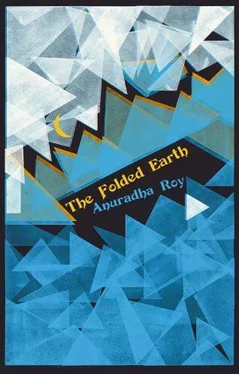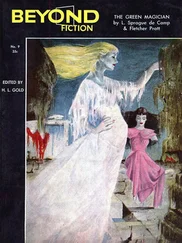“He told me it was barbed wire,” I said.
“Ah, he did, did he?” Veer said. “That’s strange, he used to boast about it when he was younger. Maybe … anyway, he had a famously glad eye — you should have seen his entourage and the adoring women — army wives and daughters, and all those summer visitors who arrived from upper-class Lucknow and Delhi. Virtually every year there would be a new — invariably very beautiful — woman who would be introduced as a friend of the family, but everyone knew she was the flavour of that year. I only came for holidays. So did he, because he lived in Surajgarh at that time, and came here for the summer. He travelled in one of those first-class carriages — the old ones — all teakwood and gilt mirrors — and his dogs travelled with him.”
I knew about the dogs because on one of the walls above the fireplace in Diwan Sahib’s drawing room was a black and white photograph of four fringe-tailed golden retrievers on an open field. Each dog was backlit, its coat glowing in white outline from the sunset. That line of light transformed them into ethereal beings with floppy ears and panting tongues. One of the dogs had a happy smile as it looked up at Diwan Sahib. His hand had intruded into a corner of the picture. A fine riding boot was visible too.
“Parties, booze, love affairs, music on the lawn and singers he invited from Benares, meat slow-cooked on wood fires, machines for hand-churned ice cream that always tasted slightly of salt,” Veer was saying. “He had no time for grubby parentless boys parcelled out between relatives for boarding-school holidays. I was left to fend for myself. The only thing that made him take an interest in me was if I asked questions about wildlife. So I thought of something new every day. Why does the woodpecker peck a tree trunk? How does the magpie fly with such a long tail? Where did all the tigers of these hills go? And then he’d give me five minutes — undivided attention — whatever he was doing. Sometimes he would do those imitations of his: birdsong, tiger calls, barking deer. After that I would be alone again until I caught the train back. All I did was eat, ready to be the school’s fatso again when the holidays were over.”
The bitterness in his voice startled me. His face suddenly appeared thinner to me, worn out with remembered pain. He turned away as if he did not want me to see it. I knitted my fingers one into the other and held them behind my back so that I would not give in to my impulse to reach out for his hand. When Veer turned to me again it was with a smile, and a question about something inconsequential. We discussed his difficulties in setting up an e-mail connection and the hide and seek his mobile’s signal played. We did not mention Diwan Sahib again that day.
Veer had by now shifted base to Ranikhet. He was a climber, a professional whose work it was to take other people on climbs and treks. He was starting a new trekking company here and was busy setting up: laying in equipment, computers, looking out for an assistant to hire. When I saw the sophisticated, expensive things he came back with from trips to Delhi, I was wracked with compassion for Michael’s ill-equipped attempts, armed with little more than his passion for the mountains. Those thick-soled shoes, that plastic tent, his windproof jacket with its twice-repaired zip — they had seemed so invincible then, so flimsy, cheap and makeshift now. It would have been a natural point of conversation for Veer and me. Yet I could not bring myself to say a word. The contrast felt too painful, the comparison almost disloyal to Michael.
Veer was away so often I might not see him for days at a stretch. We had never talked about anything personal until that afternoon. Yet every encounter with him left me feeling as if I had swallowed five cups of strong coffee at one go. A swarm of bees took up residence inside me as soon as I saw him, and they buzzed crazily, knocking against each other. I was unable to sit still, even at the factory. I was restless, and confused about the reason for it. I knew I mentioned Veer in conversation far too much but could not stop myself. I had noticed Diwan Sahib raise his eyebrow at me when I did, with a “yet again” look on his face.
That afternoon was not the first time I had felt an overpowering need to touch Veer. Not long ago, at dinner at the Light House, he was seated opposite me, telling us about a trek he had taken his clients on the year before. It was a long story involving routes, tents, altitudes, and crevasses, and Diwan Sahib stopped him often for clarifications. I had heard barely a word. There was a trace of spinach clinging to Veer’s lower lip. I was mesmerised. I noticed the exact shape and line of his lips and the cleft in his chin. I tried looking away from it; could not. I had to sit on my hands to stop myself from reaching out to stroke the scrap away.
I stared into the bathroom mirror that night, clutching a comb, forgetting it was in my hand. I did not notice the icy breath from the tiles that was freezing my toes and travelling up my legs. I remembered another time before a different bathroom mirror, moments after news of Michael’s death reached me. Water was trickling off my face that day. There were no tears. I did not know why I was in the bathroom or why I had flung handfuls of water at myself. If my body had been turned inside out at that moment, there would have been fire and drought in place of veins and muscles. My face should have been ravaged, burned away. And yet it looked as it did every other day: the same bush of dark hair around the same coffee-coloured face, the same spectacles on the same pointed nose reflected in the same stained and cracked mirror that the bathroom had come with when Michael and I rented the place. We had never got around to replacing it. Parrots quarrelled over the fruit on the rain tree that overhung the terrace adjoining our two stuffy rooms. I was conscious of the birds’ screeches, of children in the house next door practising the song they did at this time, the echoing cry of late afternoon from the flower seller who circled those warm Hyderabad neighbourhoods on his jasmine-laden bicycle. Each daily sound had seemed heavy with a meaning I could not understand. The toothbrushes — two because Michael had left his behind — the soap dish, even the steel tap, looked as if they were more than ordinary, utilitarian objects. Two of his shirts hung in the cupboard unwashed. I had made him leave them that way so that I could bury my face in them to breathe in his smell while waiting for him to return. The new camera bag his office had given him for assignments lay on the bottom shelf of the cupboard, unused.
It had taken me all these years to claw my way back from that day to some kind of normality.
I had lost my taste for adventure, my impulsiveness. I wished Veer had never come, to fling a stone into my calm pond.
It was in March that I met Charu’s Kundan Singh for the first time, when the imminence of spring spurred the hotel manager to throw a party at Aspen Lodge. There was still rain at times and sometimes knife-edged gusts of wind, but the pewter of last month’s light had taken on a pearly translucence and one morning I opened my door to find two hopeful pig-tailed infants waiting there for me to discover the little heap of pink, white and red blossoms they had deposited on my doorstep. I returned inside to get them small change to buy sweets with, as was the custom. Living alone I lost track of these things. Now I remembered that Phooldeyi, springtime’s flower festival, was not far off.
I realised when I went for the party that the hotel manager had intended to invite only those he considered people of consequence. As a penniless teacher I was out of place among the generals, brigadiers, bureaucrats. Even Miss Wilson had not been thought grand enough for the occasion. But the manager had found me with Diwan Sahib when he came to ask him, and could hardly avoid including me. “Just a few friends,” he had said, “nothing much,” and I had pictured five or six people around a sunny table in the garden.
Читать дальше












